McCray Values Wellesley Education for Developing Analytical Thinking and Leadership Skills

The votes are in: Bill de Blasio has won the 2013 New York City mayoral race and when he takes office, wife, poet, speechwriter, activist, and former Wellesley English major Chirlane McCray ’76 will become the city’s newest first lady.
Throughout the long mayoral campaign, McCray has emerged as a strong political leader and activist for the city’s “forgotten voices.” The New York Times called her “the mastermind behind the biggest political upset of the year and a sought-after voice as the city re-evaluates what it most wants from its first family.” She has been the focus of multiple in-depth profiles by major media outlets like The New Yorker and New York magazine, who have praised her for her commitment to making New York a more equitable city. “Understand Chirlane,” said de Blasio to the New York Daily News, “and you’ll understand me.”
From Longmeadow, Mass., McCray arrived on Wellesley’s campus in 1972. While she majored in English, McCray embraced the liberal arts during her four years, saying, “There were so many classes I enjoyed at Wellesley, even classes I initially didn’t think I would like. I loved social psychology, French, art of West Africa, etc., but I was influenced most by my professor Helen Stewart and her class ‘Black Women in American Society.’”
It was Stewart’s course that inspired McCray and her classmates to found Brown Sister, a publication celebrating the voices of women of color with featured work by faculty and students. “Helen Stewart encouraged and inspired us to interact with women of color of different social classes, from different parts of the U.S. and the world,” said McCray. “Bringing these women together, developing a proposal, figuring out the mechanics of publishing, all helped me discover new strengths and grow as a leader.” Brown Sister was highlighted at the college last year as part of Mosaic, a retrospective exhibit showcasing the history of women of color at the college.
“I treasured my experience at Wellesley and consider myself fortunate to have received such a great education,” said McCray. “It has served me well, not only in publishing—which was my chosen field after college—but also in healthcare, government, and in politics. After I graduated from college, my parents asked me, ‘What was the most important thing you learned?’ I told them that I learned how to think analytically and how to learn anything I wanted to.”
After graduation, McCray pursued her interest in writing and publishing on issues that mattered to her. She moved to New York to work in the magazine industry, where she spoke out about issues of race and sexuality when few others were doing so. Her passion for change eventually led her to political writing, including a position in the press office of then-Mayor David Dinkins. It was there she met de Blasio. The couple married and moved to Brooklyn, as de Blasio became more involved in politics and McCray, in a variety of positions, continued to voice her desire for New York to become a more equitable place, with a deep-hearted concern with for the city’s poor and disenfranchised members.
Throughout the campaign, the press have made frequent comparisons between McCray’s political leadership and fellow alumna Hillary Rodham Clinton ’69, whom McCray has cited as an influence. In fact, Clinton hired de Blasio to run her senate campaign in 2000. De Blasio described the experience to the press, saying, “For that year of my life, you know, I would go to work and I worked for a strong-willed, forceful, progressive Wellesley woman. And I went home to a strong-willed, forceful, progressive Wellesley woman… Chirlane and Secretary Clinton had a particular bond because of that shared pedigree.”
In her new role as the first lady of New York City, McCray seeks to be an activist calling attention to the challenges that New Yorkers face in finding good schools, good health care, and better opportunities for their families. “I believe change starts with listening to people and then helping everyone agree on a path to action,” she said. “That’s the hardest part! Once people agree and are personally invested in the solution, taking action is much easier.”
When asked what advice she’d offer young women seeking to make a difference in politics, McCray said, “Run for elective office! One of the most powerful ways to make change is to serve as an elected official. It is similar to running a business and really not as difficult as one might think. We need more women’s voices in the public debate if we want our society to make true progress.”
